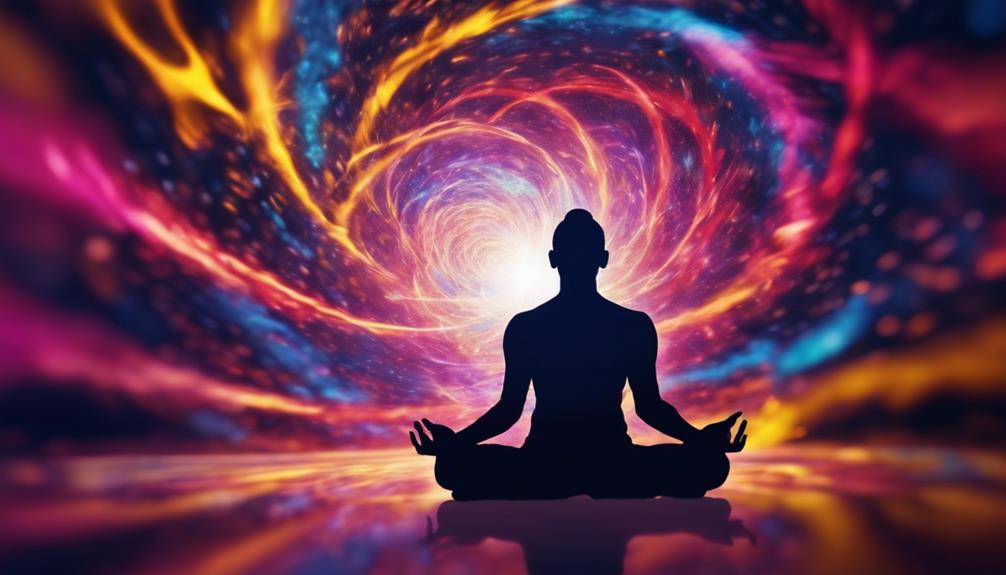Spirituality
Qualities And Training For Spiritual Counseling: Empathy, Compassion, And Cultural Competence

As I began my path toward becoming a spiritual counselor, it dawned on me that specific attributes and education are essential for successful practice.
Empathy, compassion, and cultural competence have emerged as key pillars in providing holistic support to clients. These qualities allow us to deeply understand their emotions, provide a sincere desire to help, and respect their diverse backgrounds.
Through ongoing training and education, we can enhance our skills and build credibility.
In this article, we will explore the significance of these qualities and the various ways to obtain the necessary training for spiritual counseling.
Key Takeaways
- Empathy, compassion, active listening, and cultural competence are essential qualities and skills for spiritual counseling.
- Education and training options for spiritual counseling include certificate programs, apprenticeships, mentoring, continuing education, and professional development.
- Licensing and certification can increase credibility and trust with clients, although they may not always be required.
- Cultural competence, understanding of human psychology, and a holistic approach are crucial in providing effective spiritual counseling services.
Qualities for Spiritual Counseling
I have learned that empathy, compassion, and cultural competence are essential qualities for spiritual counseling.
As a spiritual counselor, I believe in the power of empathy to truly understand and connect with my clients on a deep level. By putting myself in their shoes, I can provide the support and guidance they need during their spiritual journey.
Compassion is another crucial quality that allows me to genuinely care for my clients and show them kindness and understanding.
Lastly, cultural competence is vital in spiritual counseling as it helps me respect and appreciate the diverse backgrounds, beliefs, and traditions of my clients. By embracing cultural diversity, I can create a safe and inclusive space for individuals from all walks of life to explore their spirituality.
Skills for Spiritual Counseling
Active listening is an essential skill for spiritual counselors. It allows me to attentively hear and honor the experiences and emotions of my clients. By truly being present and fully engaged in the conversation, without judgment or interruption, I can create a safe and supportive space for my clients to share their thoughts, concerns, and beliefs. This shows them that I genuinely care about their well-being and that their voice matters.
Active listening also helps me gain a deeper understanding of their unique perspectives. It allows me to respond with empathy and compassion. Through this skill, I am able to build trust and rapport with my clients, fostering a strong therapeutic relationship that promotes personal growth and transformation.
Education Options
Obtaining a certificate or participating in an apprenticeship are viable options for pursuing a career as a spiritual counselor. These education options provide valuable training and knowledge that can enhance your skills and abilities in this field.
Certificate programs offer specialized courses in spiritual counseling, covering topics such as ethics, counseling techniques, and spirituality. On the other hand, apprenticeships provide hands-on experience and mentorship from experienced spiritual counselors. This allows you to learn directly from professionals who have extensive knowledge and expertise in the field.
Both options can provide you with the necessary tools and resources to effectively support individuals on their spiritual journey. By investing in your education and training, you can develop the empathy, compassion, and cultural competence needed to make a positive impact in the lives of those you counsel.
Training Options
By exploring various education options, I can gain the necessary skills and knowledge to become a successful spiritual counselor. There are several training options available that can help me develop my abilities in empathy, compassion, and cultural competence. These options include certificate programs, apprenticeships, mentoring, continuing education, and professional development. Each option offers unique opportunities for learning and growth, allowing me to deepen my understanding of spiritual counseling and enhance my ability to support others on their spiritual journeys.
To give you a clearer picture, here is a table summarizing the different training options:
| Training Option | Description |
|---|---|
| Certificate programs | Structured curriculum to gain foundational knowledge and skills. |
| Apprenticeships | Hands-on experience working under the guidance of an experienced spiritual counselor. |
| Mentoring | One-on-one guidance from a seasoned professional in the field. |
| Continuing education | Ongoing learning through workshops, seminars, and conferences. |
| Professional development | Enhancing skills and knowledge through specialized trainings and courses. |
Each of these training options can provide valuable insights and practical experiences that will contribute to my growth as a spiritual counselor. By investing in my education and training, I can cultivate the qualities of empathy, compassion, and cultural competence that are essential in providing effective and culturally sensitive support to individuals seeking spiritual guidance.
Licensing and Certification
Gaining the necessary licensing and certification in my journey to become a spiritual counselor is like unlocking a door to credibility and trust in my practice. While it may not always be required, pursuing these credentials is immensely beneficial.
Certification not only increases my credibility but also builds trust with my clients. It shows that I am committed to my profession and have met certain standards of knowledge and competency. By researching the requirements in my area, I can ensure that I am on the right path.
Obtaining the necessary licensing and certification demonstrates my dedication to providing quality care and support to those seeking spiritual guidance. It allows me to confidently serve my clients, knowing that I have the necessary skills and knowledge to meet their needs.
Importance of Empathy
I believe that developing a deep sense of understanding and connection with others is essential in my role as a spiritual counselor.
Empathy plays a crucial role in creating a safe and supportive space for individuals to explore their spiritual journey. By truly listening and trying to understand their experiences, I can offer genuine compassion and support.
Empathy allows me to connect with clients on a profound level, acknowledging their emotions and validating their experiences. It is through empathy that I can provide the moral and emotional support needed for personal transformation.
In my practice, I strive to create a non-judgmental and open environment where individuals feel heard and understood. By cultivating empathy, I can help clients navigate their spiritual path with compassion and understanding.
Importance of Compassion
Developing a deep sense of compassion allows me to truly understand and support individuals on their spiritual journey. Compassion is the ability to feel empathy for others and to show kindness and understanding in their times of need. It is the driving force behind my work as a spiritual counselor, as it helps me connect with my clients on a deeper level.
Compassion enables me to create a safe and non-judgmental space where individuals can openly share their thoughts, fears, and struggles. Within this space, I provide emotional support and guidance, helping them navigate their spiritual challenges with grace and understanding.
Through compassion, I strive to uplift and empower individuals, reminding them of their inherent worth and potential for growth. I believe that by showing compassion, I can help individuals find solace, healing, and transformation on their spiritual path.
In my practice, I utilize compassion to:
-
Cultivate a sense of trust and rapport with my clients, allowing them to feel comfortable and supported.
-
Encourage self-acceptance and self-compassion, helping individuals embrace their vulnerabilities and learn from their experiences.
Compassion is a fundamental aspect of my work as a spiritual counselor, and I am committed to embodying it in every interaction.
Understanding Cultural Differences
Understanding cultural differences is essential in providing effective and inclusive support as a spiritual counselor. Each individual comes from a unique cultural background, and their beliefs and values are shaped by their heritage. As a counselor, it is crucial to recognize and respect these differences, ensuring that your approach is culturally sensitive and appropriate.
To emphasize the importance of cultural competence, consider the following table:
| Cultural Competence in Spiritual Counseling |
|---|
| – Respect and value cultural diversity |
| – Educate yourself about different traditions |
| – Engage with diverse communities |
| – Prioritize effective communication |
| – Provide value-based counseling services |
By embracing cultural diversity, educating ourselves, and engaging with different communities, we can enhance our understanding of clients’ unique perspectives. This allows us to provide support that aligns with their cultural beliefs and values, fostering trust and rapport. Remember, empathy and compassion must extend beyond personal experiences and encompass the rich tapestry of cultural diversity that exists in our world.
Frequently Asked Questions
Are there any specific personal experiences or spiritual beliefs that are required to become a spiritual counselor?
No specific personal experiences or spiritual beliefs are required to become a spiritual counselor. What matters most is having empathy, compassion, and cultural competence to support others on their unique spiritual journeys.
Can someone become a spiritual counselor without any prior counseling experience or background?
Yes, it is possible to become a spiritual counselor without any prior counseling experience or background. What matters most is having a sincere desire to help others, being open-minded, and continuously learning and developing the necessary skills for this meaningful role.
How long does it typically take to complete a certificate program in spiritual counseling?
Typically, it takes around six months to complete a certificate program in spiritual counseling. This program provides the necessary knowledge and skills to effectively support individuals on their spiritual journeys.
What are some common challenges that spiritual counselors may face in their profession?
Some common challenges that spiritual counselors may face in their profession include navigating diverse belief systems, managing their own emotional boundaries, addressing clients’ resistance or skepticism, and balancing their own self-care while supporting others.
Are there any ethical guidelines or codes of conduct that spiritual counselors are required to adhere to?
As a spiritual counselor, I adhere to ethical guidelines and codes of conduct that ensure the well-being and trust of my clients. These guidelines promote integrity, confidentiality, cultural sensitivity, and a commitment to their spiritual and emotional growth.
Meet Nadi, the soulful writer and explorer of inner realms who graces OurMindAndBody.com with her profound insights and heartfelt wisdom. With a profound passion for mindfulness, meditation, and spiritual growth, Nadi weaves words that touch the hearts and minds of readers, leaving a lasting impact on their well-being journey.
Rooted in a background of philosophy and psychology, Nadi’s curiosity about the human mind and the mysteries of the soul led her on a transformative path of self-discovery. Drawn to the transformative power of mindfulness and meditation, she embarked on a quest to understand the intricacies of these practices, not only for her own growth but also to inspire others to embark on their own inner journeys.
Spirituality
Becoming A Spiritual Psychologist: Education, Skills, And Career Paths

Did you know that the field of spiritual psychology is rapidly growing, with job opportunities expected to increase by approximately 19% over the next decade?
If you have a passion for understanding the connection between spirituality and mental health, becoming a spiritual psychologist might be the perfect path for you.
In this article, we will explore the education requirements, skills needed, and various career paths available in this rewarding field.
So, let’s dive in and discover how you can embark on a fulfilling journey as a spiritual psychologist.
Key Takeaways
- Education and training requirements include a bachelor’s degree in psychology, and a master’s or doctoral degree in psychology with relevant coursework in developmental, abnormal, and social psychology.
- Personal qualities and skills required include empathy and compassion, fine communication skills, and the ability to balance western psychological principles with eastern philosophies.
- Joining professional organizations in spiritual psychology provides networking opportunities and access to valuable resources, information, and cutting-edge research.
- Career opportunities and settings for spiritual psychologists include private practice, teaching, research, consulting, and non-profit organizations.
Education Requirements
To become a spiritual psychologist, I would need to obtain a bachelor’s degree in psychology and then pursue a master’s or doctoral degree with coursework or training in spirituality. This educational foundation is crucial in understanding the complexities of human behavior and the application of psychological theories. It also provides a solid grounding in developmental, abnormal, and social psychology, which are essential in spiritual counseling.
Additionally, specialized programs focusing on spirituality and psychology, including transpersonal psychology, mystical experiences, and mindfulness practices, can further enhance my understanding in this field.
Alongside the educational requirements, it is vital to emphasize the importance of ethics in counseling. Ethical considerations play a significant role in spiritual counseling and psychotherapy, as maintaining professional boundaries while being emotionally present is essential.
By integrating these elements, I can create a holistic approach to spiritual psychology, ensuring that I provide the best possible care to my clients.
Skills Needed
Empathy and compassion are crucial qualities for a spiritual psychologist, along with active listening and maintaining professional boundaries.
As a spiritual psychologist, my role is to provide a safe and nonjudgmental space for individuals to explore their spiritual beliefs and experiences. Through fine communication skills, I aim to deeply understand their unique perspectives and challenges.
By actively listening, I can fully engage with their stories and emotions, allowing for a deeper level of connection and healing. At the same time, it is essential to maintain professional boundaries, ensuring that I am emotionally present while also respecting their autonomy and privacy.
This delicate balance between empathy and boundaries allows for a transformative therapeutic experience.
Relevant Coursework
Relevant coursework in developmental, abnormal, and social psychology helped me gain a deeper understanding of human behaviors and the application of psychological theories in my practice as a spiritual psychologist. Studying these subjects allowed me to explore the complexities of human development, abnormal psychological patterns, and the impact of social factors on individuals’ well-being.
Additionally, I learned about the role of spirituality in psychology and counseling, which has been crucial in my work with clients seeking guidance and support in their spiritual journeys. Integrating eastern philosophies with western psychology has also been a significant aspect of my training. It has allowed me to approach therapy holistically, taking into account the mind, body, and spirit.
This integration has been essential in helping my clients find balance, meaning, and purpose in their lives.
Gaining Experience
During my educational journey, I actively sought out opportunities to gain hands-on experience in the field of spiritual psychology through internships and supervised practice. This allowed me to apply the knowledge I gained from my coursework in a real-world setting and further develop my skills as a spiritual psychologist.
Gaining experience in the field of spiritual psychology involved the following:
-
Shadowing mentors: I had the privilege of observing experienced spiritual psychologists in their practice. This gave me valuable insights into the practical application of theories and techniques in a therapeutic setting.
-
Wellness coordinators: I also had the opportunity to work as a wellness coordinator in various settings, where I facilitated workshops and programs that integrated psychological principles with spiritual practices. This allowed me to work directly with individuals seeking personal growth and transformation.
-
Clinical practicums and internships: These experiences provided me with hands-on training in conducting assessments, developing treatment plans, and facilitating individual and group therapy sessions. It allowed me to apply my knowledge and skills under the guidance and supervision of experienced professionals.
Overall, gaining experience in the field of spiritual psychology was instrumental in shaping my understanding and competence as a practitioner. It allowed me to integrate theoretical knowledge with practical application and develop the necessary skills to effectively support individuals on their spiritual journey.
Specialized Training Programs
I actively sought out specialized training programs in spiritual psychology to further enhance my knowledge and skills in the field. These programs offered a unique opportunity to delve deeper into the intersection of spirituality and psychology, allowing me to gain a more comprehensive understanding of the human experience.
The benefits of specialized training programs were immense. They provided me with valuable insights and practical tools to effectively integrate spiritual principles into my practice. Additionally, these programs fostered a sense of community and connection with like-minded individuals, creating a supportive network of professionals in the field.
When searching for the right specialized program, I considered factors such as the curriculum, faculty expertise, and the program’s alignment with my personal values and goals. It was important for me to find a program that resonated with my beliefs and offered a holistic approach to spiritual psychology.
Networking Opportunities
Attending professional conferences and workshops has provided me with valuable networking opportunities in the field of spiritual psychology. Building relationships with like-minded professionals has been instrumental in my career as a spiritual psychologist.
These connections have allowed me to exchange ideas, gain insights, and collaborate on research projects. Through networking, I have met individuals who have become mentors, guiding me in my journey and offering support along the way.
The professional conferences and workshops have not only provided a platform for learning but also a space for connecting with others who share a passion for integrating spirituality and psychology. These connections have opened doors to new opportunities, such as speaking engagements, consulting gigs, and even job offers.
Networking in the field of spiritual psychology is crucial for personal and professional growth, as it allows for the sharing of knowledge, experiences, and resources, ultimately enriching our collective understanding of this interdisciplinary field.
Career Opportunities
Exploring various settings and opportunities allows for a diverse range of roles within the field of spiritual psychology. One of the career paths in this field is establishing a private practice, where you can provide one-on-one counseling and support to individuals seeking spiritual guidance. This allows you to create a safe and sacred space for clients to explore their spiritual beliefs and experiences. Another option is teaching, where you can share your knowledge and insights with aspiring psychologists or those interested in integrating spirituality into their lives. This role allows you to inspire and guide others on their own spiritual journeys. Both of these career paths offer the opportunity to make a meaningful impact on people’s lives and contribute to their overall well-being.
| Career Opportunities | |
|---|---|
| Private practice | Providing one-on-one counseling and support to individuals seeking spiritual guidance. |
| Teaching | Sharing knowledge and insights with aspiring psychologists or those interested in integrating spirituality into their lives. |
Steps to Becoming a Spiritual Psychologist
One essential step in the journey towards becoming a spiritual psychologist is obtaining a bachelor’s degree in psychology. This foundational education provides a solid understanding of human behavior and the application of psychological theories.
To further specialize in spiritual psychology, there are three key steps to consider:
-
Pursue a master’s or doctoral degree in psychology with coursework or training in spirituality. This advanced education allows for a deeper exploration of transpersonal psychology, mystical experiences, and mindfulness practices.
-
Gain practical experience through internships or supervised practice. Hands-on clinical practicums and internships provide invaluable opportunities to apply theoretical knowledge in real-world settings.
-
Network with professionals in the field through professional organizations. Joining organizations like the American Society of Spiritual Psychology or the Association for Transpersonal Psychology can offer networking opportunities, access to valuable resources, and the chance to stay updated with the latest research and trends in spiritual psychology.
Frequently Asked Questions
What is the difference between a spiritual psychologist and a traditional psychologist?
A spiritual psychologist differs from a traditional psychologist by incorporating a holistic and introspective approach, integrating spirituality in therapy. This allows for a deeper exploration of the individual’s spiritual beliefs and their impact on mental well-being.
How does spirituality play a role in the therapeutic process?
In therapy, spirituality can play a significant role. It provides a sense of meaning and purpose, and helps clients find solace in times of distress. Connecting with a higher power can offer guidance and support throughout the therapeutic process.
Can someone become a spiritual psychologist without a degree in psychology?
While alternative paths exist, a degree in psychology is necessary to become a spiritual psychologist. It provides the foundational knowledge and skills required to understand human behavior and apply theories, essential in this holistic profession.
Are there any ethical considerations specific to spiritual psychology?
Ethical considerations in spiritual psychology include maintaining client confidentiality, respecting cultural and religious beliefs, and ensuring informed consent. Following a code of conduct helps create a safe and ethical environment for clients to explore their spirituality.
How does mindfulness practice benefit both the spiritual psychologist and the client?
Mindfulness practice benefits both the spiritual psychologist and the client by promoting self-awareness, reducing stress, and fostering a deeper connection to one’s spirituality. It enhances overall well-being and allows for a more holistic approach to therapy.
Conclusion
In conclusion, becoming a spiritual psychologist is a journey of self-discovery and growth.
As I reflect on the path I have taken, I am reminded of the saying, ‘You can’t pour from an empty cup.’
This reminds me of the importance of self-care and personal development in order to effectively support others on their spiritual journeys.
By pursuing the necessary education, gaining practical experience, and staying connected with a supportive network, I am confident that I can make a meaningful impact in this field.
Together, let us embrace the power of spirituality and psychology to create positive change in the lives of others.
Say hello to Cypress, the soulful wordsmith behind the insightful articles at OurMindAndBody.com. Cypress is a gifted writer who weaves words with grace and precision, using language as a powerful tool to inspire, heal, and uplift the spirits of readers.
With a background in literature and a passion for personal growth, Cypress brings a unique perspective to the world of well-being and spirituality. Having experienced the transformative effects of meditation and yoga firsthand, Cypress is deeply connected to the essence of these practices and their potential to enrich lives.
Spirituality
What Does Spiritual Energy Feel Like? Learn Here!
Get ready to discover the gentle warmth and peaceful presence of spiritual energy, leading you on a journey of interconnected vibrations and profound awareness.

Experience spiritual energy as a gentle warmth and peaceful presence, aligning you with interconnected vibrations. Feel tingling sensations and a sense of unity with all beings. This energy manifests as love, light, or deep peace, enhancing your awareness of the unseen universe. Understand the mechanisms of harmonizing energy signatures and practice visualization techniques to hone your sensing abilities. Spiritual awakening leads to profound journeys beyond the physical, connecting you with higher consciousness. Embrace the global awakening towards heightened awareness and interconnectedness. Trust in signs and synchronicities as guidance towards alignment with your true self.
Key Takeaways
- Spiritual energy feels like gentle warmth and peaceful presence.
- It can evoke tingling sensations and interconnectedness with all.
- Often manifests as love, light, or deep peace.
- Enhances awareness of the unseen and unity with the universe.
- Tuning into subtle vibrations and frequencies is key to sensing spiritual energy.
Sensing Spiritual Energy
Sensing spiritual energy involves tuning into subtle vibrations and frequencies beyond the physical domain, allowing you to feel its gentle warmth and peaceful presence. When you open yourself up to this higher self, you may experience a tingling sensation or a sense of interconnectedness with all that exists.
This spiritual energy can manifest as a profound feeling of love, light, or a deep sense of peace that envelops you entirely. As you attune to these subtle energies, you may notice a heightened awareness of the unseen and a unity with the universe.
Connecting with spiritual energy often evokes feelings of inspiration, clarity, and purpose, illuminating your path and guiding you towards a deeper understanding of yourself and your place in the world. By tapping into this higher self and embracing the vibrations of spiritual energy, you can experience a profound sense of harmony and oneness with the cosmic forces that surround you.
Visualizing Quiet Energy

When visualizing quiet energy, focus on creating a sense of calm and steadiness within yourself. Techniques for maintaining a stable energy state through visualization are essential.
Developing visualizations to convey intent can help in achieving the desired energy quality.
Energy Visualization Techniques
Start by picturing a steady, calm, and responsive visualization of quiet energy when practicing energy visualization techniques. These techniques aim to help you connect with subtle energies, bringing you to a higher state of awareness.
By visualizing quiet energy, you can hold it steady and open yourself to external influences. The focus is on establishing a single, steady energy signature within an object through gentle energy connections.
Intermediate techniques emphasize stability and responsiveness in energy, guiding you towards a deeper understanding of energy manipulation. Training your ethereal muscles through step-by-step visualizations enhances the process of quieting energy, allowing you to hone your skills in controlling and directing energy flows.
As you engage in these visualization techniques, remember to stay present and attuned to the subtle shifts in energy around you, fostering a deeper connection with the spiritual domain.
Body Area Focus
To focus on specific body areas for visualizing quiet energy, direct your attention towards creating a steady and responsive energy flow within yourself. By visualizing and quieting energy in different body areas, you can enhance your energy control and management. Visualizing quiet energy involves techniques that help stabilize and steady the flow of energy, aiding in maintaining a gentle hold and openness to external influences.
| Body Area | Focus of Visualization | Purpose |
|---|---|---|
| Head | Clarity and Calmness | Clearing the mind |
| Heart | Love and Compassion | Cultivating empathy |
| Abdomen | Grounding and Stability | Enhancing stability |
| Hands | Receptivity and Giving | Fostering connection |
| Feet | Connection to Earth | Strengthening foundation |
Mechanisms of Energy
You may wonder how spiritual energy operates within you.
Understanding the mechanisms of energy involves recognizing the intricate process of harmonizing various energy signatures into a cohesive flow.
Energy Sensation Description
Feeling the subtle energy produced by living cells involves differentiating between chi sensing and reading emotions for accurate perception. Spiritual energy sensation requires you to quiet your own energy to effectively sense and understand others' energy. Visualizing quiet energy as steady, smooth, and calm can aid in honing your energy sensing abilities. By creating gentle energy connections throughout an object, you can maintain a single, steady energy signature for accurate perception.
Chi sensing involves tuning into the energy flow within and around living beings. This practice allows you to sense the subtle vibrations and movements of energy, providing insights into the spiritual essence of a person or object. Distinguishing between chi energy and emotional energy is essential for interpreting the true nature of the energy you perceive.
Through practice and mindfulness, you can sharpen your energy sensation skills and gain a deeper understanding of the spiritual energies at play.
Sensory Perception Techniques
Understanding the intricacies of energy sensing involves delving into the mechanisms that govern sensory perception techniques.
When it comes to energy sensing, the focus is on differentiating between emotions and subtle energy emanating from living cells.
To effectively sense and perceive this energy, it's essential to quiet your own energy, allowing you to tune in more acutely to the energies around you.
Visualization plays a fundamental role in this process, aiding in holding energy steady and responsive.
By creating a gentle energy connection throughout an object, you can achieve the desired energy signature, enhancing your ability to perceive and interact with subtle energies.
These sensory perception techniques rely on honing your awareness and sensitivity to energy flows, allowing you to navigate the intricate world of spiritual energy with greater clarity and precision.
Energy Impact Awareness
Exploring the mechanisms of energy impact awareness involves delving into how different energy signatures interact and influence one another. In the spiritual awakening process, heightened awareness plays a significant role in perceiving these subtle energy shifts.
When tuning into these energies, pay attention to physical symptoms that may arise, indicating changes in energy dynamics. Sensing energy requires understanding the interplay between your chi and the energies around you.
To achieve quiet energy, it's vital to smooth out multiple energy signatures within an object and create gentle energy connections to maintain a steady energy flow. The key to effectively sensing energy lies in quieting your own energy first, allowing you to accurately perceive and interact with the energies of others.
Ethereal muscles also contribute to this process by aiding in the quieting of energy and enhancing your ability to sense and manipulate different energy signatures.
Visualization Techniques

Utilizing visualization techniques in spiritual energy work can greatly enhance your ability to quiet and stabilize energy fields effectively. When engaging in spiritual or religious practices, signs and symptoms of unbalanced energy may manifest. By incorporating visualization techniques, you can create a steady and responsive energy field, allowing for smoother energy flow and communication of intent.
These techniques focus on stabilizing and smoothing out the various energy signatures present within you. Through visualization, you can establish gentle energy connections throughout your being, fostering a harmonious energy flow. Maintaining a gentle hold on this energy enables you to be more responsive to external influences, aiding in your spiritual journey.
Understanding Spiritual Awakening

When delving into spiritual energy work, one may encounter a profound journey known as spiritual awakening. This journey involves expanding awareness beyond the physical domain and connecting with your Higher Self. Through spiritual awakening, you transcend the ego and return to the Original Spirit, experiencing a higher level of consciousness.
| Spiritual Awakening | Higher Self | Expanding Awareness |
|---|---|---|
| Seeking deeper meaning | Connection to true self | Transcending physical boundaries |
| Embracing breakdowns for growth | Unity with the divine | Elevating perception beyond the material |
| Unique disorientation | Inner wisdom | Oneness with all beings |
During spiritual awakening, you may find yourself drawn to explore spiritual topics like crystals and auras, as well as experiencing moments of loneliness and seclusion. The journey unfolds uniquely for each individual, leading to shifts in beliefs, behaviors, and perspectives towards a higher consciousness.
Global Awakening Insights

The ongoing global awakening towards higher awareness is a transformative shift impacting individuals and societies worldwide. This global awakening signifies a monumental energy shift as Earth evolves into its fifth-dimensional self, fostering a heightened awareness and interconnectedness.
The rising of consciousness isn't isolated but rather a universal phenomenon that transcends borders and cultures, emphasizing unity and collective evolution. As humanity moves from a third-dimensional reality to a fifth-dimensional existence, the current global awakening serves as a pivotal moment in our energetic evolution.
This shift towards higher awareness beckons individuals to deepen their connection to the collective energy of humanity, fostering a sense of oneness and harmony on a global scale. Embracing this wave of awakening allows for profound personal growth and a broader perspective that extends beyond the confines of the individual self.
The energy of this global awakening propels us towards a brighter future filled with unity consciousness and a shared vision of peace and love.
Illusion of Physical World

Exploring the depths of the physical world reveals profound insights into the nature of reality and the essence of spiritual energy. Quantum mechanics, a field of study that deals with the behavior of particles at the smallest scales, showcases that physical matter is primarily energy, highlighting the illusion of the physical world. This understanding challenges traditional views and emphasizes the energetic nature of the material world.
The concept of the illusion of the physical world suggests that what we perceive as solid and tangible is, in fact, a manifestation of energy with immense potential waiting to be harnessed. The observer effect and quantum entanglement further dive into this notion, providing a glimpse into the energetic nature of reality.
Navigating Awakening Process

Beginning on your awakening journey is a deeply personal and transformative experience that unfolds uniquely for each individual. As you navigate through this profound process, remember that the universe guides us in mysterious ways, leading us towards higher consciousness and spiritual growth.
Here are some key points to keep in mind as you commence on your awakening journey:
- Awakening Begins: The initial spark of awakening often arises unexpectedly, igniting a desire for deeper understanding and connection to the spiritual domain.
- Guidance Along the Way: Trust in the signs and synchronicities that present themselves, as they serve as a compass guiding you towards enlightenment.
- Sign of a Spiritual Shift: Embracing the challenges and revelations that come with awakening is a clear sign of your soul's readiness to evolve and expand.
Embrace this transformative journey with an open heart and mind, knowing that each step taken brings you closer to alignment with your true self.
Frequently Asked Questions
How Do You Describe Spiritual Energy?
You describe spiritual energy as a subtle, gentle vibration or tingling sensation. It feels warm, comforting, and soothing, like a flow of positive energy. Some describe it as expanded awareness or a sense of connection to something greater.
What Does a Spiritual Experience Feel Like?
A spiritual experience feels like a profound calmness embracing you, a warm energy gently coursing through your being, and a sense of unity with all. You might notice tingling sensations, heightened awareness, and deep emotional clarity.
What Are the Symptoms of Spiritual Awakening?
You feel a shift within, questioning beliefs, sensing synchronicities, and feeling disconnected. Relationships transform, intuition heightens, and you seek authenticity. The call to serve grows stronger, déjà vu moments occur, habits change, and empathy deepens.
Can People Sense Your Energy?
You can sense your energy. Others pick up on your emotions, attention, and subtle energy from living cells. Understanding chi and emotional cues helps you grasp how people perceive your energy. Quieting your energy is key.
Conclusion
As you explore further into the domain of spiritual energy, you'll begin to uncover the mysteries of the universe.
The sensations you feel will steer you on a journey of self-discovery and enlightenment.
Embrace the unfamiliar, trust your intuition, and let the energy flow through you.
The path ahead may be uncertain, but the possibilities are endless.
Keep investigating, keep expanding, and keep experiencing the incredible power of spiritual energy.
Meet Kiran, the guiding light of wisdom behind the empowering content at OurMindAndBody.com. As a talented and compassionate writer, Kiran weaves words with grace and insight, sharing profound knowledge and practical advice to inspire positive transformations in the lives of readers.
With a background in psychology and a deep-rooted passion for well-being, Kiran brings a unique blend of expertise and empathy to her writing. Her journey into the realm of mindfulness, meditation, and yoga began as a personal quest for self-discovery and healing. Having experienced the profound benefits of these practices firsthand, Kiran is committed to empowering others to embark on their own journeys of self-exploration and growth.
Spirituality
What Does Green Spiritual Energy Mean? Discover Now!
Mystical and transformative, green spiritual energy embodies love and healing, inviting you to explore its profound significance for growth and harmony.

Discover the spiritual depth of green energy embodying love, healing, and heart connection for growth and harmony. Immerse yourself in the profound meaning behind this nurturing aura, symbolizing compassion and renewal in personal and spiritual domains, fostering balance and well-being. Uncover how this energy guides individuals towards self-love, empathy, and harmony with nature, enhancing emotional stability and inner peace. Explore the significance of the heart chakra and its role in healing, empathy, and personal development for a fulfilling life. The green aura holds transformative powers that can illuminate your journey to spiritual growth and emotional fulfillment.
Key Takeaways
- Represents the heart chakra, embodying love, compassion, and healing energy.
- Fosters growth, renewal, and balance between physical and spiritual aspects.
- Nurturing, empathetic, and drawn to nature's beauty.
- Promotes personal development, self-love, and emotional stability.
- Encourages compassion, harmony, and connection to nature for a fulfilling life.
Symbolism of Green Aura
Green aura symbolism revolves around the heart chakra, embodying love, compassion, and healing energy. When your aura shines green, it signifies a deep connection to the heart center, radiating warmth and understanding. This color represents the balance between the physical and spiritual aspects of your being, fostering growth and renewal within.
Individuals with a green aura are often nurturing and empathetic, drawn to nature's beauty and tranquility. Your spiritual energy in shades of green symbolizes not only fertility and hope but also the cycle of life's transformations. The heart chakra, associated with this color, opens you to love, forgiveness, and acceptance, promoting harmony in relationships and self-healing.
Embracing your green aura means embracing peace, growth, and a profound sense of spiritual rejuvenation. Allow the energy of the heart chakra to guide you towards a life filled with love, compassion, and inner balance.
Characteristics of Green Energy

Green spiritual energy embodies qualities of growth, balance, and renewal in your spiritual journey. It symbolizes the heart chakra, encouraging compassion, love, and healing energy within you.
Embracing green energy fosters harmony with nature, inner peace, and emotional stability in your life.
Green Energy Attributes
Representing qualities of growth, renewal, and harmony, green spiritual energy embodies a connection to the heart chakra and promotes compassion and healing.
Green auras emanating from this energy signify a deep connection to nature and the Earth, fostering a sense of balance and spiritual growth. The heart chakra, associated with green energy, encourages feelings of compassion, love, and empathy towards oneself and others, leading to inner peace and emotional stability.
Furthermore, green spiritual energy promotes personal development and self-love, nurturing a strong sense of well-being and harmony within. By aligning with the energy of the heart chakra, individuals can experience a heightened awareness of their interconnectedness with the environment, fostering environmental consciousness and a deep respect for the natural world.
In essence, green energy attributes encompass a holistic approach to spiritual growth, emphasizing the importance of compassion, harmony, and connection to nature in achieving a balanced and fulfilling life.
Spiritual Significance Insights
Exploring the spiritual significance insights of green energy reveals its profound connection to nature and its transformative impact on emotional well-being and harmony.
When it comes to green spiritual energy, there are key characteristics that hold significant importance:
- Green Aura: A green aura signifies harmony, growth, and balance in one's spiritual journey.
- Aura Colors Change: Witnessing your aura colors change to green can indicate healing and a deeper connection to nature.
- Associated with Heart Chakra: Green energy is closely associated with the heart chakra, fostering love, compassion, and emotional balance.
- Spiritual Awakening: Embracing green energy can lead to spiritual awakening and inner peace, enhancing one's spiritual growth.
- Emotional Balance: Incorporating green in your spiritual practices can help in promoting emotional balance and a sense of well-being.
Green Aura in Relationships
Within relationships, individuals with green auras exhibit a remarkable ability to provide unwavering support and nurturing qualities to their partners. Their loyalty and empathy create a strong foundation for meaningful connections.
Green aura individuals excel at offering emotional support, understanding their partner's needs, and fostering a sense of security within the relationship. Balancing the care they give to others with self-care is essential for maintaining healthy dynamics.
Prioritizing harmony, compassion, and open communication, those with green auras contribute to creating a safe and loving environment for growth and healing. Their presence in relationships often leads to deep connections and a profound sense of emotional fulfillment.
Interpreting Green Aura Meanings

Understanding the meaning of a green aura involves recognizing its connection to love, growth, and balance, as well as its ability to radiate compassion and healing energy. When interpreting a green aura, consider the following:
- Individuals with green auras are often nurturing, empathetic, and connected to nature.
- Green auras are linked to the heart chakra, symbolizing harmony, renewal, and spiritual awakening.
Dark green auras may suggest jealousy or unresolved emotional issues.
Bright green auras reflect inner peace, tranquility, and a strong connection to the heart chakra.
Interpreting a green aura involves acknowledging its positive traits like compassion, growth, and healing, while being mindful of potential challenges such as neglecting self-care.
Green auras can provide valuable insights into a person's personality traits, energy field, and overall well-being.
Role of Green Aura in Chakras

The green aura plays a significant role in the chakras, particularly in relation to the heart chakra's energy and its impact on emotional well-being and spiritual growth.
Linked to the heart chakra, the green aura symbolizes love, compassion, and emotional balance. Individuals with a green aura are often nurturing, empathetic, and deeply connected to their emotions. Balancing the heart chakra through green energy promotes harmony, forgiveness, and self-acceptance. This balance fosters healing, not only for oneself but also for others.
The presence of a green aura signifies a strong sense of empathy, a deep connection to nature, and a journey towards spiritual growth. People with a green aura are inclined towards nurturing others, fostering a sense of community, and aiding in emotional healing processes. Embracing the green aura's energy can lead to a more profound understanding of oneself and a heightened capacity for empathy and healing.
Impact of Green Aura on Personality

Individuals embodying a green aura often exhibit a nurturing and compassionate personality. People with a green aura prioritize emotional support and care for others, symbolizing a harmonious and balanced personality focused on healing and renewal. They're known to be loyal friends and empathetic partners in relationships, always offering a listening ear and a comforting presence. Balancing self-care while providing nurturing to others is pivotal for those with a green aura to maintain harmony in their lives.
- Nurturing Nature: Individuals with a green aura are inherently nurturing, always ready to provide care and support.
- Compassionate Demeanor: People with a green aura show compassion towards others, offering understanding and kindness.
- Healing Focus: The green aura signifies a focus on healing, both emotionally and spiritually.
- Balanced Personality: Those with a green aura exhibit a balanced personality, seeking equilibrium in all aspects of life.
- Emotional Support: Individuals with a green aura excel at providing emotional support, creating a safe space for others to express themselves.
Changing Aura Colors: Insights

To gain insights into changing aura colors, consider exploring the impact of different practices like meditation and energy healing. Auras change over time, reflecting shifts in one's emotional, mental, and spiritual well-being.
Individuals with a green aura, symbolizing growth and harmony, may notice fluctuations in their aura based on their experiences and inner balance. People with a green aura are often nurturing and empathetic, embodying qualities of renewal and a strong connection to nature.
The color of your aura is connected to your state of being, and incorporating practices such as meditation can help maintain or shift your aura colors. By focusing on self-care and balancing the act of nurturing others, individuals with a green aura can promote harmony within themselves and potentially influence the color of their aura.
Embracing Green Aura Healing

Embracing green aura healing can lead to profound transformations in your emotional and spiritual well-being. Green aura healing taps into the essence of compassion, nurturing your empathetic nature and fostering a sense of divine love within you.
By delving into the domain of green spiritual energy, you open yourself up to a world of healing possibilities that can enrich your life and those around you.
Here are some key benefits of embracing green aura healing:
- Enhanced Compassion: Green aura healing helps you cultivate a deeper sense of compassion towards yourself and others.
- Nurturing Nature: Embracing green aura healing nurtures your inner self, promoting self-care and emotional balance.
- Empathetic Transformation: Green aura healing encourages an empathetic nature, allowing you to connect more deeply with others.
- Healing Energies: Individuals with a green aura are often natural healers, emanating healing energies to those in need.
- Divine Love: Connecting with green spiritual energy opens your heart to the divine love that surrounds us, fostering harmony and growth in your spiritual journey.
Frequently Asked Questions
What Does the Color Green Symbolize?
Green symbolizes nature, growth, rebirth, health, and hope. It represents the cycle of birth, death, and rebirth with transformative properties. The color resonates with inner peace, spiritual awakening, and divine love, offering a sense of peace and harmony.
What Is the Rarest Aura Color?
The rarest aura color is white, symbolizing purity and spiritual enlightenment. Individuals with white auras have transcended earthly concerns, embodying a deep spiritual connection and high spiritual evolution. They radiate pure, positive energy and consciousness.
What Is the Color of the Healing Aura?
The color of the healing aura is green. It symbolizes balance, renewal, and harmony. Green spiritual energy signifies growth, compassion, and nurturing qualities. People with a green aura are often healers and empathetic individuals.
What Do the Colors Mean Spiritually?
Colors spiritually represent various aspects of life. Each has unique meanings and energies. Green symbolizes growth, healing, and balance. It encourages you to connect with nature, embrace change, and cultivate compassion. Allow green energy to guide your spiritual journey.
Conclusion
So, now you know all about green spiritual energy!
It's like a breeze of renewal, a wave of tranquility, and a burst of growth all wrapped into one magical color.
Embrace the power of the green aura and watch as your relationships blossom, your chakras align, and your personality shines brighter than ever before.
Get ready to tap into the abundant healing energy of green and let it transform your life in ways you never thought possible!
Meet Kiran, the guiding light of wisdom behind the empowering content at OurMindAndBody.com. As a talented and compassionate writer, Kiran weaves words with grace and insight, sharing profound knowledge and practical advice to inspire positive transformations in the lives of readers.
With a background in psychology and a deep-rooted passion for well-being, Kiran brings a unique blend of expertise and empathy to her writing. Her journey into the realm of mindfulness, meditation, and yoga began as a personal quest for self-discovery and healing. Having experienced the profound benefits of these practices firsthand, Kiran is committed to empowering others to embark on their own journeys of self-exploration and growth.
-

 Personal Growth2 months ago
Personal Growth2 months agoThe Power Of Kindness: Cultivating Happiness, Connection, And Personal Growth
-

 Meditation1 day ago
Meditation1 day agoUnderstanding Spiritual Attacks: Types, Signs, And Protection
-

 Aura1 week ago
Aura1 week agoUnderstanding The Grey Aura: Balance, Neutrality, And Personal Growth
-

 Spirituality3 months ago
Spirituality3 months agoThe Power Of Spiritual Connection: Definition, Importance, And Ways To Achieve
-

 Spirituality2 months ago
Spirituality2 months agoStarting Your Spiritual Journey: Self-Reflection, Growth, And Connection
-

 Spirituality3 months ago
Spirituality3 months agoConnecting Spirituality And Daily Life: Embracing Universal Values
-

 Spirituality3 months ago
Spirituality3 months agoThe Mystical Realms: Exploring Spiritual Dimensions
-

 Meditation3 weeks ago
Meditation3 weeks agoThe Symbolic Significance Of Sand Dollar: Spiritual Meanings And Cultural Connections




















